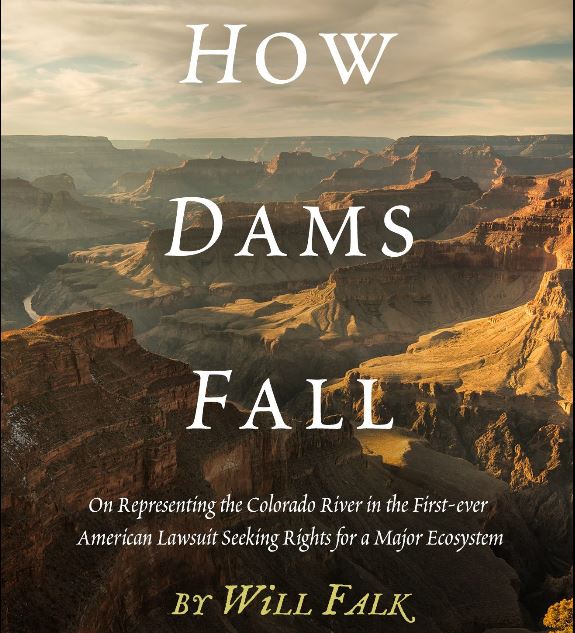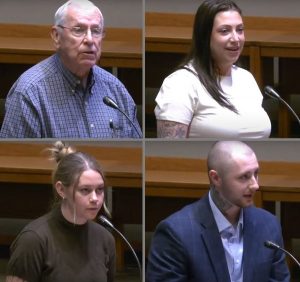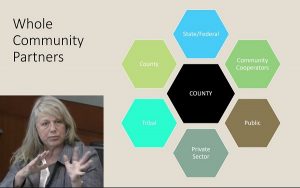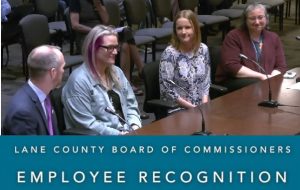Will Falk: Stop drinking ‘green energy’ Kool-Aid
8 min read
Attorney, activist, and author of How Dams Fall, Will Falk.
[00:00:03] Will Falk: I went to law school at the University of Wisconsin in Madison. I felt like being a public defender would be a great way to fight back against one of the most racist systems in the United States—which is the criminal justice system. And I thought that representing poor people accused of crimes would be a way that I could push back against this racism. The caseload was really high and I burned out spectacularly. Finally, I ended up trying to kill myself.
[00:00:37] And I really had kind of an epiphany moment. I realized that the natural world is always giving me life. The natural world always ensures I have something to eat, I have water to drink, I have air to breathe, and now the natural world is offering me something, I guess, more spiritual that is sustaining and creating my life. And when I felt that I immediately felt a corresponding desire to reciprocate that.
[00:01:03] Ten thousand years ago, every traditional culture, every human culture on earth understood and practiced similar beliefs to the notion that the natural world is full of our kin, is full of other beings that we should respect and honor.
[00:01:18] Many of these cultures actually taught and said that human beings are the lowest in the world because we have so much to learn from all these other creatures. And these cultures taught the sacredness of the relationships that we have with the natural world and all of these other beings.
[00:01:34] And before humans could in good conscience start destroying the natural world, they had to silence the voice of the natural world. They had to turn the natural world into an object. I think we understand this more and more within human relationships.
[00:01:48] I think we just, we saw for the last 100 years that if you want to destroy a people, first you have to demonize those people. You have to make them less than human. You have to turn them into objects so that you can destroy them en masse. And that, that all happened—we did that in our cultures.
[00:02:06] These dominant agricultural civilized cultures that grew up, they’re all premised in the objectification of nature and premised in the notion that the natural world is only composed of objects that exist for human use.
[00:02:21] And water, of course, is one of the first. If you think of water as her own being, or rivers and streams as their own beings, we had to objectify them in order to dam them and create diversion canals for agriculture.
[00:02:35] Water is one of those great unifiers that if you can convince people that water is an object, then you can grow a whole economy off of that. The dominant culture and the dominant economy has to objectify that and then convince the rest of us that this objectification is totally natural, in order to do what it does.
[00:02:55] What’s actually happening for the natural world? What’s really going on out in the real world, out in the natural world? I think it’s really important to understand that things are really, really bad right now.
[00:03:08] A hundred species are being pushed to extinction every single day. Scientists also say that we’re in the midst of this sixth mass extinction event that is happening much faster than the previous five extinction events—1,000 times faster than natural extinction rates happen.
[00:03:24] We are losing so much today that we’re never going to get back. There are beings that are being destroyed right now that will never be seen again on the face of Earth. And if that isn’t the most serious existential crisis that Earth has ever seen, I don’t know what is. And we need to start living like that’s the existential crisis that we’re in.
[00:03:44] With so much of the natural world under attack, when I fell in love with the natural world, I realized that I couldn’t claim to love the natural world if my beloved was under assault and I wasn’t fighting back with everything I have to stop that.
[00:03:58] We’re losing so much. And so we have to get really effective really quickly.
[00:04:04] I’ve been involved in a campaign for almost two years now. It’s to stop a massive open-pit lithium mine from destroying a beautiful mountain pass in northern Nevada called Thacker Pass.
[00:04:17] On Sept. 12, 1865, 70 Paiute men, women, and children were massacred by federal soldiers in Thacker Pass. This was part of what was called the Snake War. And the Snake War was a war that was fought when European-American settlers started invading the Great Basin, specifically for mining.
[00:04:39] Silver and gold mining was a big thing in the 1860s and we’re not usually taught in American history, like, ‘How come those Native Americans fought back so hard?’ Well, there’s lots of documented interviews with the people who fought in that war. The soldiers at the time knew exactly what that war was being fought for, and it was being fought to open up that land for mining.
[00:04:59] So in 1865, 70 people paid the ultimate price to stop mining in Thacker Pass. In 1865, there were Native Americans living on their ancestral lands, they’d been there for 12,000 years, and they were willing to literally fight to stop the destruction of that place. And they failed, and Nevada will never be the same. And if we continue to fail, none of these places are ever going to be the same.
[00:05:26] It is called Peehee Mu’huh in the local Paiute dialect. I was first introduced to it through my dear friend Max Wilbur who co-wrote a book called ‘Bright Green Lies,’ analyzing all of these so-called ‘green’ energies that we’re being sold right now. It’s a book that asks, ‘Well, how green are they?’
[00:05:47] And Max had read about this massive lithium mine in northern Nevada. And I don’t think that you can make any case that an open-pit mine is good for any natural creature. Any sage grouse, any sagebrush, any pronghorn antelope, any mule deer, any Mormon cricket. There’s just nothing good about an open-pit mine.
[00:06:10] And yet this seems to be this kind of, ‘Electric cars are going to save the planet. Green extraction is going to save the planet.’ This is a Kool-Aid that has totally taken over the environmental movement, and people seem to be falling for this hook, line, and sinker.
[00:06:26] So we went and set up camp on Jan. 15, 2021. That was the same day that the Bureau of Land Management issued the final record of decision permitting the Thacker Pass mine. I agreed to represent the Reno-Sparks Indian Colony in litigation against the Thacker Pass mine.
[00:06:45] Going through a whole lawsuit, a whole court case with clients, I try and explain to them the limitations of our strategy, the limitations of law. I explain to them that, like in the Thacker Pass thing, if we could succeed in delaying this permit for a year or two, that would be a huge success.
[00:07:06] But there is going to be a time when Lithium Nevada has done everything it needs to do, and as long as its shareholders are still willing to put up the money to create this mine, they’re going to do that. And this tactic will reach its limitation.
[00:07:20] But I still do it because I think that you can use the legal system to illustrate a deeper point. Law is nothing more than a justification—that’s the definition I came up with—a justification for the application of power.
[00:07:39] Law cannot save the planet and law will not save the planet, at least law as it’s currently conceived of. And the Thacker Pass campaign, I think, is a perfect example. People can use federal public land until a mining corporation puts a mining claim on that land. And the law will protect that mining claim over any other use of the land.
[00:08:03] And yes, that does include Native American sacred uses, ceremonial uses. There are many, many examples, many famous cases in environmental (law) and what they call Indian law where tribes have told the federal government, ‘This is literally the most sacred place in the world.’
[00:08:20] And the courts, the judges shrug and say, ‘Well, we’re really sorry about that, but there has to be a separation of church and state in our government. And if we protected your sacred sites, we couldn’t have mining, we couldn’t have logging, we couldn’t have all kinds of other extraction. So we will not protect your ceremonial sites.’
[00:08:40] Once the mine is up and running, it will use 5,200 acre-feet of water. That’s a massive amount of water, and this is in a water management unit that they’ve been saying is overdrawn by 30,000 acre-feet. So if a basin is already overdrawn and you’re taking 30,000 acre-feet of water out per year, more than can be replenished, and then you add another (5,200), so 35,000 acre-feet of water, basic arithmetic will tell you that at some point you will draw all that water out of the basin.
[00:09:17] Especially with something like water, there’s no surpluses in nature. Everyone uses what’s there, whether we’re talking about the sagebrush, the grasses, the insects, the fish, the snails in Thacker Pass. All of that water is needed where the water already is by countless creatures.
[00:09:36] And this is a principle that we can apply to any issue. If you are extracting too much from the earth, then it can’t replenish those communities, those natural communities can’t recover. And that’s because nature has no surpluses. Everyone uses everything where it is. And everything is always needed where it is…
[00:09:54] The things that give me strength are: walking down a sidewalk in a city and seeing tree roots tear up the sidewalk; seeing those videos of eagles attacking drones in the air; seeing the videos of sharks tearing up underwater cables in the ocean; reading reports of how much damage to industrial infrastructure rats by themselves do every single year.
[00:10:17] The natural world is fighting like hell as hard as the natural world can against against all this destruction. So we have a whole world of allies out there, that are doing everything they can to ensure that this beautiful planet that we live on can survive.
[00:10:34] And I think that that can be such an encouraging and strengthening thing if you go and build your own personal relationship with the natural world, I believe that sooner or later you’ll come to understand that the natural world is full of these other beings that are communicating with each other, can communicate with us, have their own amazing roles to play in all of this.
[00:10:55] And I think you’ll realize that the natural world is full of your kin, of truly your family members, of your close friends.
[00:11:03] John Q: Will Falk visits with the Oregon Community Rights Network. His book “How Dams Fall” discusses the first federal lawsuit seeking to represent the rights of nature.



